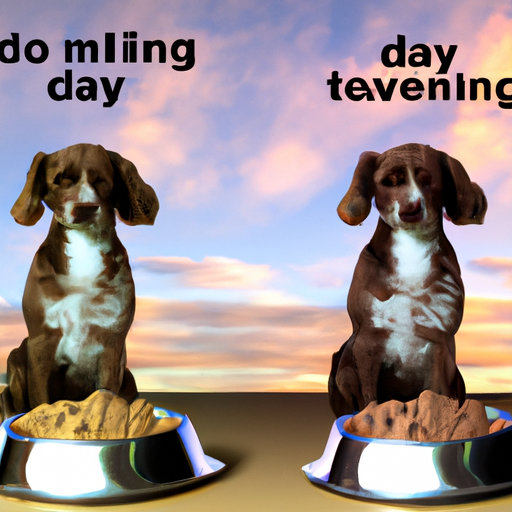As caregivers for our canine companions, we want to provide the best possible care to ensure they lead healthy, happy lives. One essential aspect of a dog’s health is their diet, which can often lead to the question: Why do dogs only eat twice a day? This article explores this topic in detail, providing factual information and insights to help you understand your dog’s eating habits better.
Table of Contents
- Understanding a Dog’s Digestive System
- Why Twice a Day?
- The Importance of Routine
- Potential Problems with Overfeeding
- Frequently Asked Questions
Key Takeaways
- Dogs’ digestive systems are designed to eat more substantial, less frequent meals.
- Feeding dogs twice a day helps maintain their energy levels and prevent obesity.
- Consistency and routine in feeding times are beneficial for a dog’s overall health.
- Overfeeding can lead to numerous health problems, such as obesity and digestive issues.
Understanding a Dog’s Digestive System
Just like humans, dogs have a digestive system that breaks down food into nutrients. However, a dog’s digestive process differs from ours in a few significant ways. Dogs are primarily carnivores, which means their bodies are designed to digest large amounts of meat and fat. They have a more acidic stomach and a shorter digestive tract compared to humans, allowing them to digest their food more quickly. This is why dogs can handle eating larger meals less frequently. For more detailed information on how a dog’s digestive system works, visit this link.
Why Twice a Day?
Feeding your dog twice a day is not just a random decision made by dog owners and experts. It has a basis in the natural feeding behavior of dogs’ wild ancestors. In the wild, dogs would usually hunt and eat only once every 24 to 48 hours, consuming large quantities at a time. This pattern is echoed in the two-meal-a-day plan that many dog owners follow.
Feeding your dog twice a day helps maintain their energy levels throughout the day. It reduces the risk of blood sugar drops and spikes, which can negatively affect your dog’s energy and behavior. The twice-a-day feeding schedule also helps prevent obesity, a common issue in domestic dogs. Overeating can result in weight gain, and feeding smaller amounts more regularly can help manage your dog’s weight. For more information about dog feeding schedules, check out this article.
The Importance of Routine
Dogs thrive on routine, and establishing a consistent feeding schedule plays a crucial role in their overall health. Feeding your dog at the same times each day can help regulate their digestive system and maintain consistent energy levels. It can also help with training, as dogs often respond well to routine-based commands.
Potential Problems with Overfeeding
While it might be tempting to feed your dog more often, overfeeding can lead to numerous health problems. These include obesity, digestive issues, and diseases such as diabetes. It’s essential to find a balance between providing enough food for your dog’s energy needs and avoiding overconsumption. For tips on how to prevent overfeeding, you can visit this page.
Frequently Asked Questions
-
Can I feed my dog more than twice a day? – While some dogs may require more frequent meals due to health conditions or age, generally, feeding a healthy adult dog twice a day is sufficient.
-
What if my dog is still hungry after eating? – Dogs may appear hungry even when they’re not. It’s important to feed your dog the right amount of food for their size, age, and activity level, rather than responding to begging behavior.
-
Should I feed my dog at the same times every day? – Yes, consistency in feeding times can help regulate your dog’s digestive system and maintain their energy levels throughout the day.
-
What if my dog doesn’t eat both meals? – If your dog consistently ignores one of their meals, it may be a sign that you’re feeding them too much. Try reducing the portion size. If your dog continues to ignore their food or shows other signs of illness, consult with a vet.
By understanding why dogs are typically fed twice a day, you can make informed decisions about your pet’s diet and overall health. Remember to monitor your dog’s behavior and consult with a vet if you notice any changes in their eating habits or overall health. For more information about dog care, visit this website.



